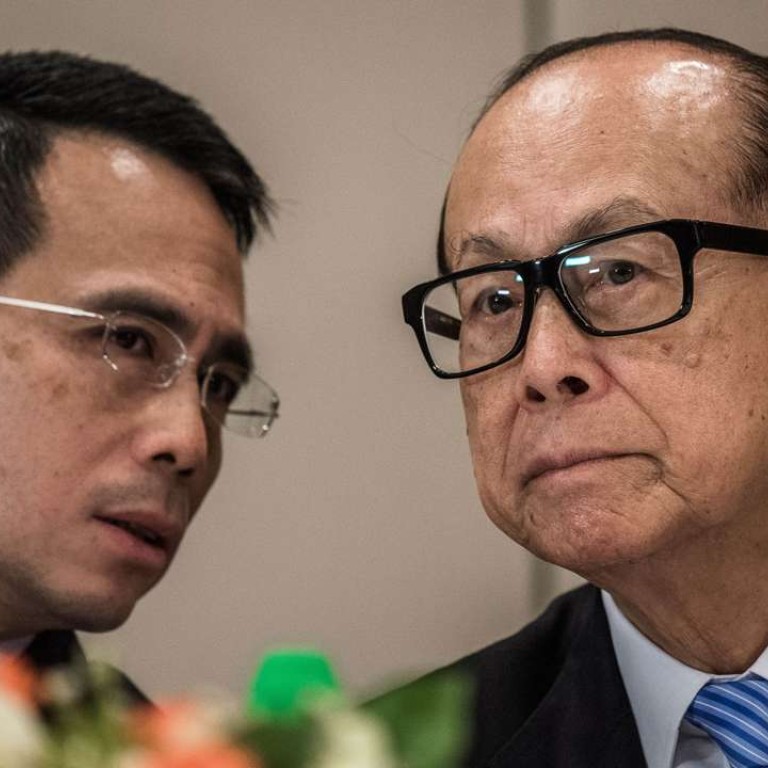
Cheung Kong Infrastructure hit hard by falling pound
With well over half its revenue generated in Britain, the country’s slumping currency leaves 8.8pc dent in CKI’s interim pre-tax profit
Cheung Kong Infrastructure (CKI), the infrastructure-focused investment firm controlled by tycoon Li Ka-shing, posted a 4.9 per cent rise in interim net profit on Monday, although the overall result was heavily influenced by an asset sale.
Excluding the HK$781 million one-off profit from the sale of a minority stake in its Australia unit Spark Infrastructure in June, the company’s pre-tax profit actually declined 8.8 per cent to HK$5.02 billion, after the firm was hammered by the recent dramatic fall in the pound.
CKI is heavily exposed to volatility in the British currency. The company said it generated 58 per cent of its first-half profit from the country, which remains its biggest source of revenue.
CKI’s net UK profit for the period was HK$3.19 billion, flat from the year earlier, which it attributed to the weaker pound. The profit was 6.6 per cent higher in pound terms.
Its global operations delivered a net profit of HK$5.51 billion in the first-half, up from HK$5.25 billion in the year-earlier period.
Revenue remained largely flat at HK$14.06 billion, compared with HK$14.11 billion last time, CKI said.
Shareholders are being paid an interim dividend of 63 HK cents per share, up 5 per cent from 60 cents previously.
Evan Li, HSBC’s head of Asia-Pacific utility and alternative energy research, last month estimated CKI generated 73 per cent of its earnings from Britain last year, and that its profit for the whole of this year could fall between 6 and 8 per cent, if the pound maintained a level of around US$1.25 against the dollar. The pound has hovered between US$1.29 and US$1.35 in the past month, and traded at around US$1.32 on Thursday morning.
Analysts polled by Thomson Reuters now have an average annual net profit estimate of HK$10.4 billion on CKI, 6.7 per cent lower than in 2015.
As well as Britain, the company is invested in power, gas, water utilities and infrastructure projects in Holland, Portugal, mainland China, Hong Kong, Australia, New Zealand and Canada.

Earlier on Thursday, a filing to Hong Kong stock exchange showed CKI’s 38.87 per cent-owned international power and gas utilities unit Power Assets posted a 7.4 per cent rise in net interim profits to HK$3.48 billion, but analysts said that was due to a one-off loss made from selling a stake in HK Electric in the year-earlier period.
Excluding this loss, underlying profit fell 7.8 per cent due to the lower pound.
UBS head of Asian utilities research Simon Powell said Power Assets’ interim result was in line with forecasts.
“Investors will be neutral to negative on this result,” he said. “The pound has been weaker since [late June], but this might be countered by the possibility of [acquisition] news.”
CKI’s profit from Australia, meanwhile, jumped to HK$1.44 billion from HK$549 million due to the asset disposal gain. Excluding the gain, core profit grew 19.3 per cent in Hong Kong dollar terms and grew 27 per cent in Australia dollar terms.
In the first half of the year, sterling has fallen 6.7 per cent against the greenback, averaging US$1.43 compared with US$1.53 in the second half of last year.
Besides the pound’s value, Powell said CKI was also affected by the “full effect” of permitted return rate reductions from its British, Australian and New Zealand offshoots, after those took effect during the period under review.
They included its 40 per cent-owned UK Power Networks, a power distributor in eastern and southeastern England, which saw its baseline permitted return on equity drop to 6 per cent from 7 per cent since April last year. Its 40 per cent-held water supplier and sewage treatment firm Northumbrian Water also had its return rate cut to 6 per cent from 8 per cent.
Its 23.07 per cent-owned South Australia Power Networks has had its allowed return on equity reduced to 8 per cent from 11 per cent since mid last year, while that of 50 per cent-held power distributor Wellington Electricity in New Zealand has been cut since April last year.
The lower utilities returns, however, were offset by a greater profit contribution during the six months from its 50 per cent-owned British railway rolling stock leasing firm Eversholt Rail, which it bought last year, it said in its statement.

